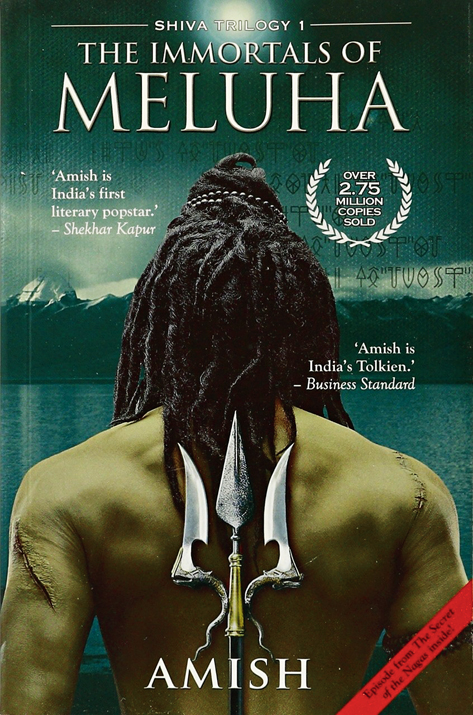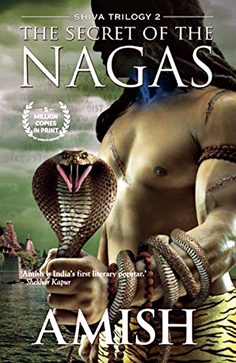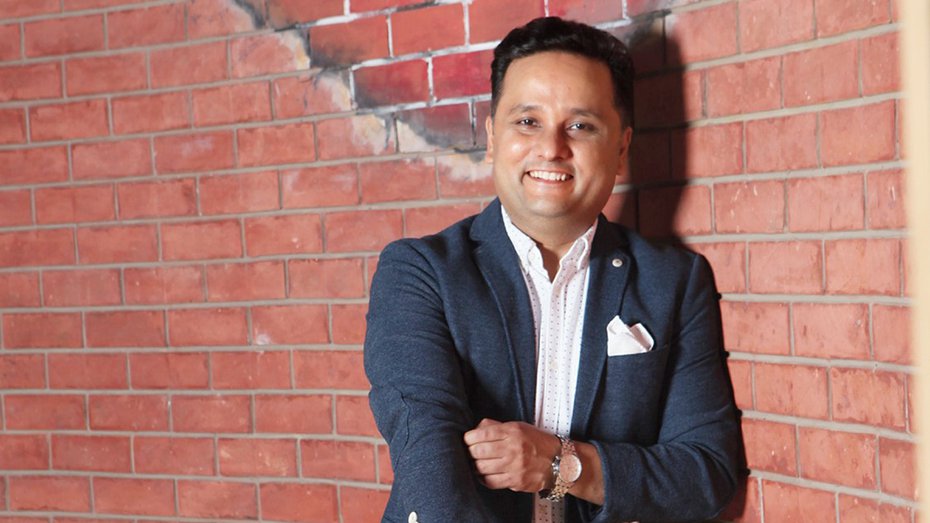He has earned many titles from his readers as well as media platforms worldwide that include “most powerful Indian” and “bestseller of India” (literally). His books have sold millions of copies in multiple languages and Amish Tripathi decided to forego a life in finance to write books that Lord Shiva gives him the ideas to. Currently an Indian diplomat in London, as the director of the Nehru Centre there, his job is to build the Indian narrative in what he considers one of the most powerful cultural cities in the world. It’s been a couple of months that he has been in London and now the lockdown has made things more difficult. But that hasn’t deterred him from consulting his Writers’ Centre, to create his latest book Suheldev: The King Who Saved India (Westland; 325pp; Rs 399) that launched on June 20. The Telegraph got on a fun Zoom call with the author to discuss his life till this lockdown and what he thinks awaits us, as we delved deep into his new book. Excerpts...
How is this lockdown treating you?
I have always seen myself as a bit of a loner and I don’t socialise or do interviews outside of my book launches. But there is a difference between being a loner and a monk and I think I am realising that difference now. A loner essentially doesn’t have a wide social circle but has some close friends and family around. Right now, I am completely alone in London! Have been so for a few months. So yes, I have realised that I am not a monk (laughs).
How do you think the world will emerge from this chaos? Is social media abetting any of the preemptive changes that may or may not occur?
One of the key things we, people who are thinkers and observers like authors and journalists, need to realise is that social media is not real life. In real life people never behave that rudely. Life is somewhere in the middle of the perfection that Instagram makes it out to be and as bad as Twitter makes it out to be.
I never comment on politics, but because of this crisis, in the governments, I see a roll-up of powers across democracies around the world and it’s only natural. People are scared and they want safety. Whatever the right and left may say, there is an inverse relation between security and privacy and each society tries to find its ideal balance between the two. Every government has apps which track everything, even say New Zealand which is seemingly “liberal” (gestures air quotes). So there will be a roll up of power but my hope as a proud democrat and liberal — liberal word has been redefined now; by liberal I don’t mean leftist, I mean the true sense of the word — I hope that democracies across the world emerge stronger than authoritarian countries. And I say this to every democracy, that whatever criticism you have of your democracy, they are a whole lot better than the latter. People keep saying that the space for criticism is going down but the fact that you can even criticise… boss, in a democracy you can shout from rooftops that you are not being allowed to shout from rooftops. In an authoritarian country you would be dead! Democracies aren’t perfect but this is one of those seminal moments in history where all democrats have to realise which side is better, more moral. This is something as a society we need to understand.
Doesn’t your personal politics then become a choice between the frying pan and the fire, instead of striving for the ideal or what is deemed perfect?
One has to realise that life isn’t perfect. Maybe it is a pandemic that will make one realise that life is far more complicated. Most of the biggest crimes in history have been committed by individuals who were striving for perfection. Which messy balance do you prefer? I only speak for myself because there are people who prefer authority because they enjoy order. Authoritarian countries don’t have the chaos that happens in democratic countries but I would much rather live in this chaos. It’s my personal view, everyone need not subscribe to it and the fact that I can admit that, makes me a democrat. Societies can go in two directions — either they can rediscover traditions and spirituality, as every crisis tends to do that, or some society may double down on hedonism, much like the roaring ’20s! As sociologists have analysed, those are reactions to the devastation of World War I, Spanish flu and the pandemic. Let’s see!

The Immortals of Meluha, by Amish Tripathi Book Cover
Tell us about this deep connection that you feel with lord Shiva. How was it born and at what age?
I was born in a Shaivite family and I have grown up with Lord Shiva. Like any other traditional Indian household, which is what mine was, there is no concept of false god. No one thought ‘this is the true God and all other Gods are false’. On the contrary, my father worships the Nirgun Nirakara, my mother is a goddess worshipper, my elder brother is a Lord Ram worshipper, my twin brother is a Lord Krishna worshipper while my elder sister and I are Shaivites, we worship Lord Shiva. That’s one aspect.
Now why I get inspired by Lord Shiva… I am by nature a rebellious, anti-elitist person. Lord Shiva is the ultimate God of rebels, who is essentially cool and exciting. He doesn’t differentiate between high born and low born and ‘Shivji ki baraat’ is an idiom that means anyone can join! He is a brilliant dancer, musician and the originator of Yoga — he is the Adi Yogi.
I did have a phase of atheism during college and after for over a decade. When I started writing Immortals of Meluha, that kinda pulled me back into faith, perhaps because I got a deeper understanding of him.
Much like comfort food, people tend to have a comfort book, one that they go back to in times of emotional excess. What is yours?
The Dharmik religions — Hinduism, Buddhism, Jainism and Sikhism — are not religions of a book. These are religions of a library! Thousands and thousands of texts; and faith helps us discover the particular ones that are meant for us. Of course I have read the Shaivite Puranas but there are many stories and philosophies that inspire, not just one single book. There have been hymns even by Adi Shankaracharyaji, which inspire me.
Tell us about the Writers Centre. Did you feel any kind of disassociation with the book at any stage?
I am a control freak when it comes to my book. I am otherwise relatively chilled out. But my books — its the purpose of my life yaar! I have spoken of this often that I have too many story ideas for one lifetime. At the pace I write, I would die before I finish my stories. I don’t want to die without having written all the stories, meri aatma bhatakti rahegi (laughs). At the pace I write, I would finish a book in a couple of years. I have hired writers to whom I give the written summary of the story. Then the Centre gives me the first draft which I work upon and finalise the manuscript. Since I am working on both the beginning and the end of it, the book reads like any of my books. So, for me, it is my baby but this is the only way. I don’t want to misrepresent so the information is on the cover as well as the beginning of the book. It will read to my reader like any of my other books. Once the system is stable, hopefully there will be a book coming out of my house every four-five months!
There are two distinct schools of writers — those who stress and obsess over the art of writing and the other school that focuses on making the storyline the protagonist, over language. Which school would you belong to?
See, English is not a high-quality language like Sanskrit or Urdu. It is a language of commerce, not for poetry and prose. What you are essentially saying is the Valmikiji and Ved Vyasji dichotomy. In Valmikiji’s Ramayana, you can get lost in turn of a phrase. He describes things in such wonderful ways. Sanskrit scholars claim that many of his similes and metaphors have been grafted onto poems by other Sanskrit poets. A portion of Kalidasa’s Meghdootam describes the clouds in the exact same way Valmikiji did when Lord Rama had to wait to cross the sea to Lanka. So Valmikiji was about beautiful language. On the other hand, Ved Vyas was about stories and philosophies, using a language that can only be described as efficient. If you are explaining deep philosophies like Shanti Parva or Vidurneeti, you can’t confuse people with complicated language. I love Valmikiji’s school, which is about appreciating the rasa and beauty of language but I follow Ved Vyasji’s school, which is to convey deep philosophies.
You have previously spoken about the attention span of the youth today where they either give you 10 seconds or an entire week of binge watching. Does that put pressure on content creators?
If a writer or a creator starts taking pressure of this, I suspect they will mess it up. Then they tend to take the easy route — something really crazy, violent or debauch that will attract attention. But that is essentially a spiral to the bottom.
It’s not easy because I can understand the pressure of money. But if you can cut yourself off from reaction and write for yourself, where, if it works great, if it doesn’t that’s fine too. That purity of spirit is important. I am lucky because if a book doesn’t work out, I can go back to my banking job. Books for me are sacred. I will do marketing and whatever is required of me so that people who are betting on me, don’t lose money. But books are the voice of my soul. I am open to feedback but unless I see reason, even if a million people tell me, I will not accept it. I write that way and I am lucky that till now, it has worked.
Does being referred to as a “Hindu writer” come with any fear of alienating a part of your audience?
I agree I am a Hindu writer because I am a Hindu. That would be interpreted negatively only if someone assumes that me being a Hindu automatically means I hate other religions or other countries. That’s not true at all. In my puja room I have idols and marks of various faiths. That is not un-Hindu and I am a proud Hindu. I wear a Om Namah Shivay kadha, a rudraksha mala. I think the problem only happens when people start saying my religion is the true religion and someone else’s religion is false. Hinduism doesn’t say that.
You come to any of my events, you will find people of all religions and in the Indian way nobody thinks that is out of the ordinary. I have had Muslims come to my event and open their questions saying Har Har Mahadev. They don’t think they are being any less Muslim. Unfortunately, this vast majority of Indians don’t make for good press. They won’t appear attractive on a news channel or newspaper. There are 1.3 billion of us and often... we are a continent. Can you find 500 or 1,000 people who are crazy? Of course you can! In every community you can and they are the only people who appear on the media. So are you saying all 1.3 billion of us are crazy? If that was, our per capita of violence would not be among the lowest in the world. See the data! Yes, most of us are deeply religious but most are centrist, liberal and relatively chilled out. There is a patriotic fervour and I don’t see anything wrong with that. But the extremism that one sees in certain parts, even of social media, is not universal. Had it been, you would have seen a different country.
So would you explore beyond Hindu mythology?
Yes, I would. I have left clues in my previous books, you know? Of the stories, I would write in the future, in the Shiva trilogy and Ramachandra series. I have some ideas based on Egyptian mythology, some on Greek and some on Celtic mythology. Hopefully, I will write all of them. See why I think I need the Writers’ Centre? (Laughs out loud!)

The Secret of the Nagas, by Amish Tripathi Book cover
Tell us about your new book Suheldev
This is set in the 11th century. I think there is one of the mistakes that our established historians have made. We don’t call the British colonial rule, the Christian rule. So why do we call the Turkic colonial rule, the Islam rule? Popular culture has also played a role. Whenever British rule is shown in Indian cinema, they would use Tom Alter who is so obviously different in appearance. Whereas if the Turkic colonial rulers had to be shown, you would have Ranveer Singh or Prithviraj Kapoor. They did not look like them because then we start thinking they were Indians, which they were not. Turks are from Central Asia. And the Turkic invaders were one of the most brutal invaders the world has ever seen. That is one aspect that is not clearly represented in our history.
The second thing was the way history was taught us. Mahmud of Ghazni came and seamlessly after that, Muhammad Ghori came and the so-called “Islamic rule” began. But one came in 1026 and the latter came in 1190! That’s a really long time during which the Turks were going around massacring the world. So how come they didn’t come to India in those 160 years, it is a bloody long time! The answer is the Battle of Bahraich that was fought by king Suheldev who destroyed the Turkic army down to the last men. To me, this king is a wonderful figure of unity because he managed to inspire Indians of all religions, castes, languages and regions to be united under his leadership and fight the foreign invader and protect the motherland. I think this is a very important message. If we Indians are united, we are unbeatable. But our default state is to fight each other. And a story like this is very important and relevant.
Geography plays the most important role in history, with geographical boundaries playing more important a role than characters in the tale. Do you feel with this shared global anguish and modern connectivity, the idea of geographical boundaries is getting obliterated?
True history has been defined by what our geography has done to us. The Indian subcontinent is the only land in the world that had six-and-a-half complete river systems till the Saraswati river system dried out, while most countries are lucky if they have one. We have been a land of plenty for long and there is no reason for us to be poor. If we are, it’s because invaders looted us or we were stupid, as we were with our economic policies till 1991 — we chose poverty. That has obviously impacted our culture.
What has happened in the last few decades is mass media and social media. There is no local news any more, the local is global. Now we come to know about a disaster in a far off land within seconds. There is a positive side to this which is the emergence of a common culture through linkages formed. The negative side is that we now think everything is going to the dogs. This is what is happening, this meme complex culture and very naturally there is a reaction to it. There are some people who would rather remain rooted and they believe that if you belong everywhere, you actually belong nowhere. The real debate is between the globalists and the nationalists or the rooted ones.
Which is your favourite Amish read? Tell t2@abp.in










